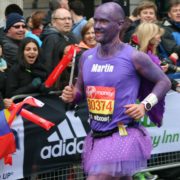Why You Need to Eat Fat.
There is a common myth in the weight-loss world that eating fat makes you fat. For years, the diet industry (and government) campaigned that it was the fat in foods that made you overweight.
Therefore, most foods and diets for the last 30 years have promoted ‘low fat’ as being good. So why is the world getting fatter then?
New studies are now showing that there is no direct correlation between eating fat and your weight. At this point I will clarify that fat contains around 9 calories per gram compared to 4 calories per gram for carbohydrates and proteins. So eating the same amount of fats as carbs or proteins will result in you taking in more calories. But eating fat in moderation, as is the case with everything, will not make you fat.
Eating fat (the good kind), can actually help with fat loss, boost your metabolism and improve overall health. It is also essential for body cell development and certain brain functions. That’s why you will never see me telling you to cut fat out of your diet.
Today I’m telling you that it’s time to ditch the low-fat diet, and start incorporating fats back into your meals.
Low fat does not mean healthy.
Due to the power of advertising and marketing, the many years of low-fat diets being promoted has now made people assume that if a food is packaged as ‘low-fat’ it is good for you. However, in order for them to remove the fat from the food, salts and sugars are usually added, together with various additives and flavourings to make the food taste good.
‘Low-fat’ means that the food must contain no more than 3g of fat per 100g (3%) for solids, or 1.5g of fat per 100ml for liquids (1.5%) or 1.8g of fat per 100ml for semi-skimmed milk.
‘Reduced fat’ is even more ambiguous, being defined as the food must contain at least 25% less fat than the regular product to which it is being compared, and at least 3g less fat per 100g of food.
So a ‘reduced fat’ product may still be 50% fat, it is just not as high as the original product it is being compared to.
My advice is to always read the labels and to make sure you know what the food is made up of. Concentrate more on the calorie content of the food. If you need any advice, please get in touch.
Why fat is good? Your body needs the right nutrients to function properly. Fats are essential for your body, brain and organs to function properly. They also help rebuild cells, give you energy and produce hormones. That’s why it’s an essential nutrient to include in your daily diet. Especially when you are doing extensive exercise and your body requires proper fuel. However, there is a big difference between fats. Most people define good fats as polyunsaturated fat and monounsaturated fat and categorise saturated fats as a bad fat.
Polyunsaturated fats: These fats help lower your bad LDL cholesterol, as well as contain your essential omega-3 fatty acids. Omega-3 fatty acids are what helps boost brain function, improve your immune system and your mood. You’ll find these fats in your foods like salmon, mackerel, flaxseed, walnuts and chia seeds.
Monounsaturated fat: These fats help raise your good HDL cholesterol and lower your bad LDL cholesterol. This helps to reduce the build-up of plaque in your arteries and prevent heart disease. Studies have also shown that these fats also help to reduce belly fat. Foods that contain monounsaturated fats are olive oil, cashews, almonds, peanuts, sesame seeds and avocados.
Coconut oil is another great example of good fat you can eat. It contains medium-chain fatty acid, which are a healthier form of saturated fats. Our body metabolises these fatty acids differently, and immediately converts it to energy for our brain and muscles to function. It’s also great for boosting your immunity, metabolism and helps to improve digestion.
Saturated fats: Saturated fats are usually solid at room temperature (animal fats, butter, cheese, etc). These, if eaten in bulk, can raise your cholesterol and increase your risk of heart disease. These fats should make up a lower proportion of your fat intake.
Trans fats: Trans fats are the worst, as they are made from unsaturated fat that has been chemically processed to prolong the shelf life of packaged foods. They do not only raise your bad LDL cholesterol, and contribute towards heart disease, but they also increase inflammation in the body. Foods that include these fats are often processed cakes, crackers, crisps, biscuits, butter-type spreads and chips. In packaged foods, look out for the ingredient ‘hydrogenated vegetable oil’ as this is trans fat. You’ll be surprised at how many foods you’ll find that contain these chemically processed trans fats.
So, if you want to remove your body fat, it’s not about removing fat from your diet completely. It’s about finding a good balance between eating whole nutrient rich foods like vegetables, fruit, lean meat, nuts, seeds, legumes and fats in moderation. So ditch the low-fat diet and start nourishing your body instead with healthy wholesome foods.
If you want any advice, please contact me using the details below.
Want to know more about running, personal training or nutrition?
Contact me today to ask any questions or to book your FREE consultation
Call me on 07815 044521 or email me at martinhulbertpt@gmail.com









